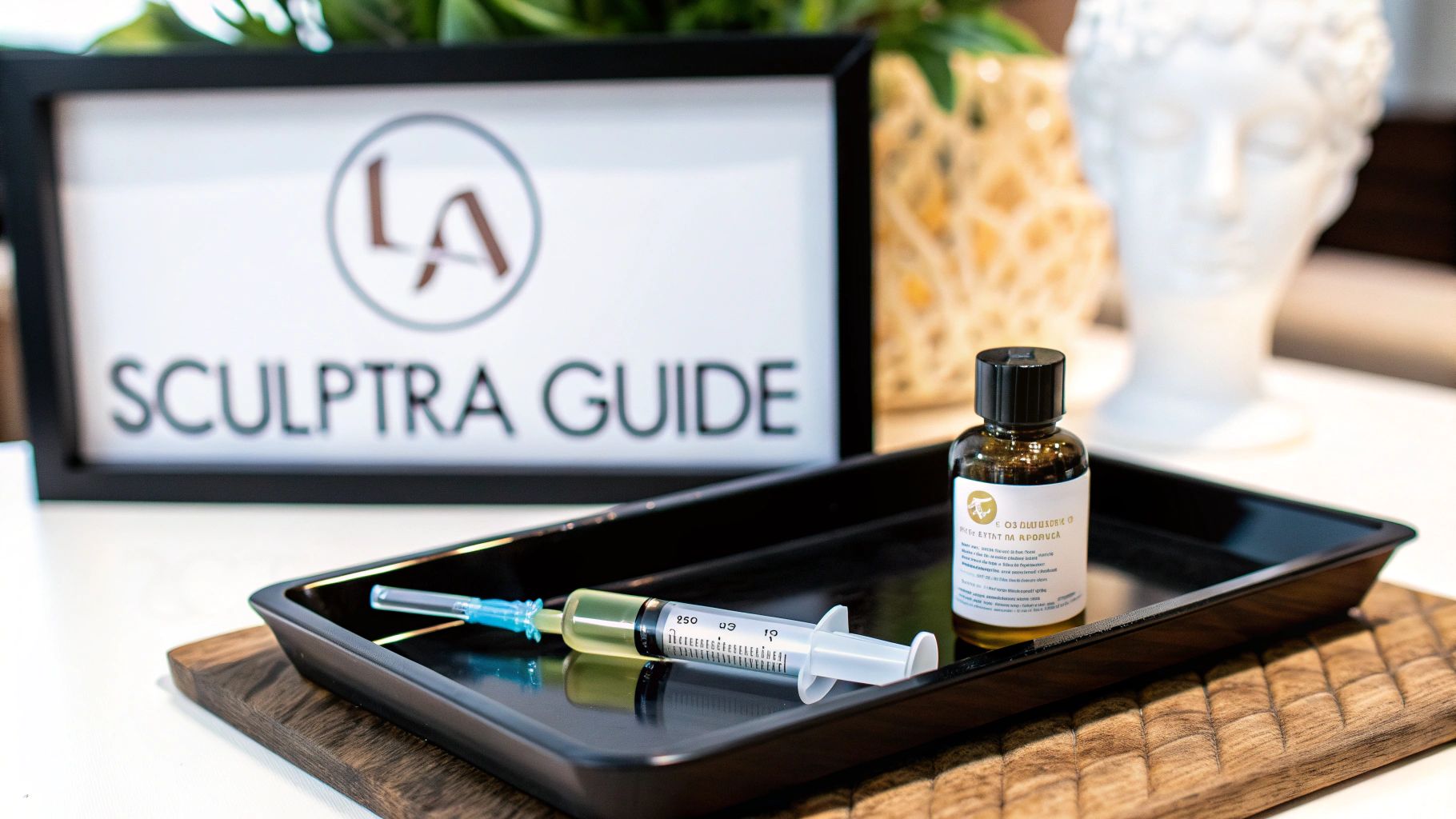
February 15, 2026
What Is Sculptra Treatment A Guide to Rebuilding Your Natural Collagen
What is Sculptra treatment? Explore how this unique collagen stimulator works to gradually restore facial volume for natural, long-lasting rejuvenation.
Oct 3, 2025

When you're considering plastic surgery, the single most important decision you'll make is choosing the right surgeon. It's not about the flashiest office or the biggest social media following; it's about verifying the foundational, non-negotiable credentials that protect your health and ensure a great result.
Before you even think about scheduling a consultation, you need to do your homework. This initial vetting process is your first and best defense against unqualified practitioners.
Think of this process like building a house. You wouldn't pick out furniture before you're certain the foundation is solid, right? The same logic applies here. A surgeon's credentials are their foundation, and you need to make sure they are rock-solid. These aren't just fancy certificates; they represent years of specialized training, rigorous exams, and a proven commitment to patient safety.
Your initial research should be a simple, focused filter. If a surgeon doesn't clear these first few hurdles, they're off the list. Period.
Your vetting process starts with three core qualifications. Any surgeon who can't tick all these boxes should be removed from your list immediately, no matter how convincing their website is.
This infographic breaks down the key things to look for.
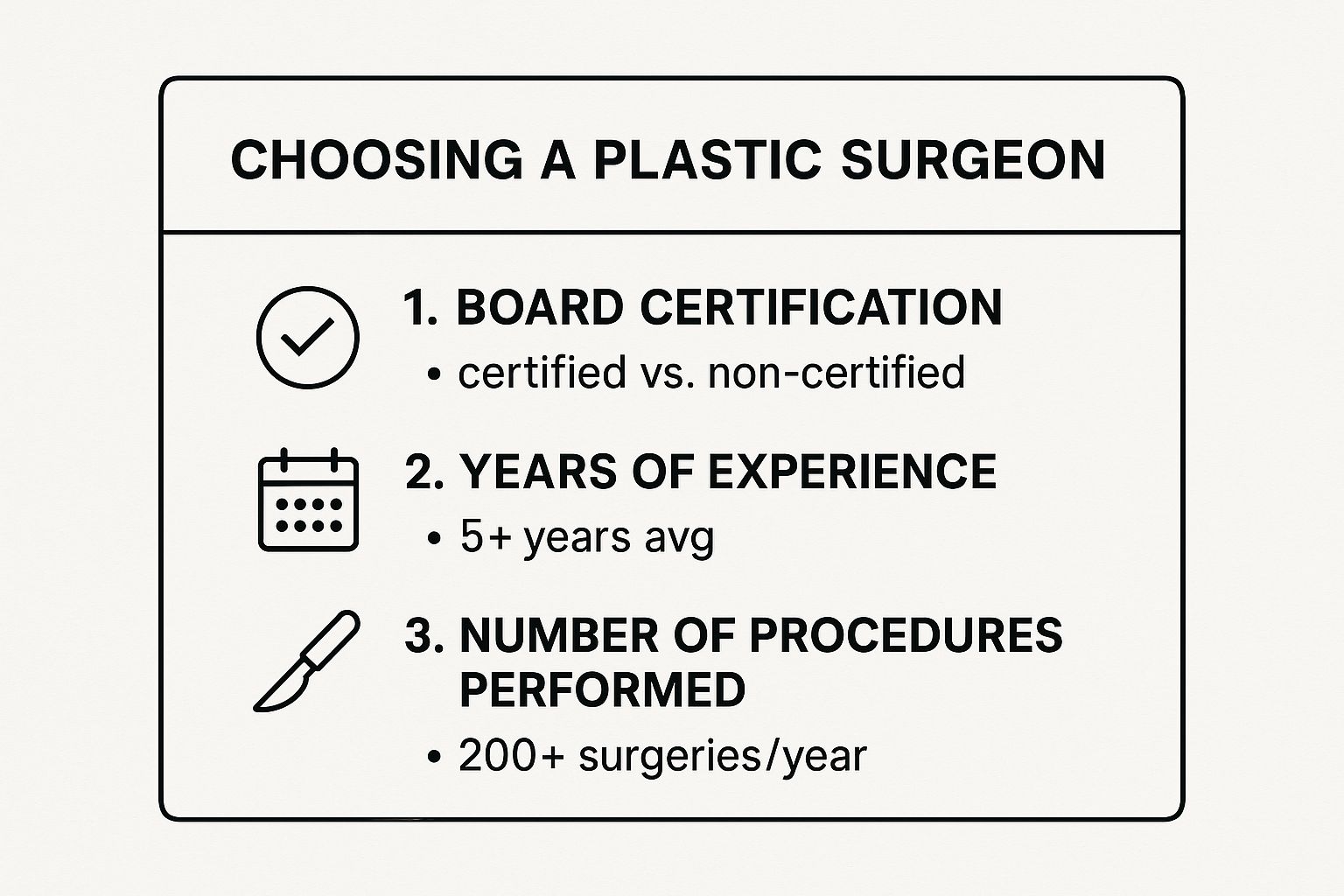
As you can see, the path to a safe and successful surgery always starts with a board-certified surgeon who has plenty of experience with your specific procedure.
The most crucial factor here is board certification. There are over 58,500 board-certified plastic surgeons worldwide, a number that sounds big but is a small fraction of the doctors performing cosmetic procedures. With nearly 38 million procedures done annually across the globe, choosing a surgeon certified by a recognized board, like the American Board of Plastic Surgery, is your guarantee of their training and ethical standards.
A surgeon without admitting privileges at a local, accredited hospital is a major red flag. It may suggest that their skills and qualifications haven't passed the scrutiny of their peers on a hospital review board.
To help you keep track, here's a quick checklist you can use as you research potential surgeons.
This table is your quick-reference guide for vetting the absolute essentials. Use it to confirm that any surgeon you're considering has the right qualifications to ensure your safety and a successful outcome.
Taking the time to verify these credentials is the most important step in your entire surgical journey.
While finding the right surgeon is unique, the core principles of checking credentials and building trust are universal. You can see similar advice reflected in these essential considerations when choosing a healthcare professional. For a deeper dive into what board certification means for you, we cover the advantages of choosing a board-certified plastic surgeon on our blog.
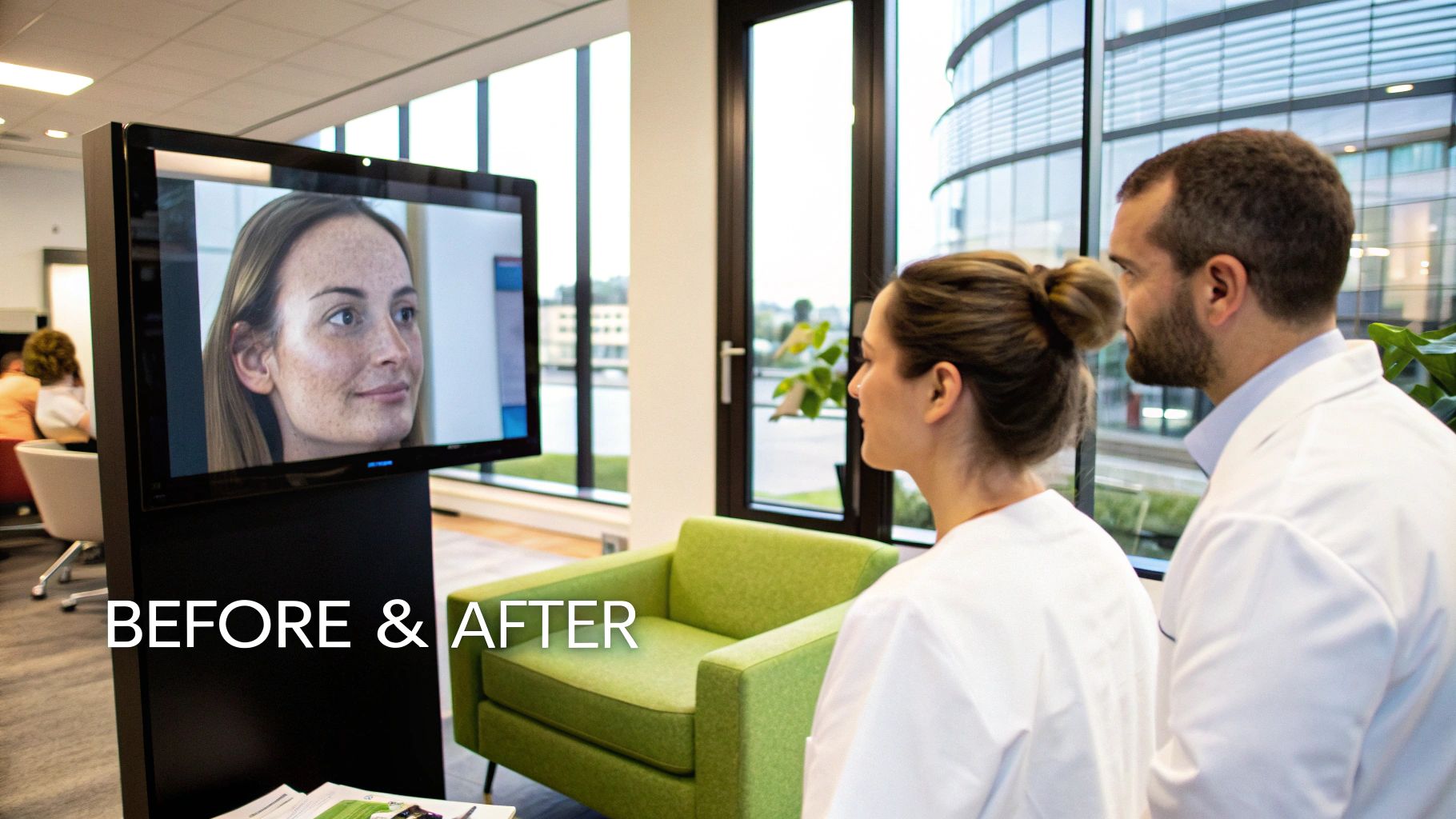
So, you've confirmed your potential surgeon is board-certified and has hospital privileges. That’s the baseline. Now comes the real work: finding the right artist for the job.
It's easy to forget that "plastic surgeon" is a very broad term. A surgeon who is a true master of facelifts might not be the best choice for a breast augmentation, and that's okay. Expertise in this field is built on focus and repetition. You're not just hiring a doctor; you're commissioning a specialist who has honed the specific craft you need.
This next phase is about moving past credentials and digging into their actual, hands-on experience and aesthetic vision.
Many fantastic plastic surgeons perform a wide variety of procedures. But when it comes to highly complex surgeries like rhinoplasty or intricate body contouring, a specialist often delivers more refined and predictable results. It just makes sense. A surgeon who performs several nose jobs a week has a far deeper, more intuitive grasp of nasal anatomy than someone who does it once a month.
Think of it like this: you wouldn't ask a general home builder who does a bit of everything to craft custom, high-end cabinetry for your kitchen. You'd find a cabinetmaker. The same logic holds true here.
To find that specialist, you have to ask the right questions during your research and consultations.
A surgeon’s experience isn’t just about the number of years they’ve been in practice. It’s about the number of times they have successfully performed your specific procedure and refined their technique along the way.
Ultimately, you're looking for someone whose daily work is centered on the exact outcome you're hoping for. That focus is what often separates a good result from a truly exceptional one.
A surgeon's before-and-after gallery is their portfolio. Learning how to read it is one of the most powerful tools you have. It's your only real window into their technical skill and, just as importantly, their artistic eye.
Don't just scroll through the pictures. Study them. When you're trying to figure out how to choose a plastic surgeon, their gallery reveals their unique artistic signature. Your job is to find results that you personally find beautiful.
Here’s a practical checklist for reviewing a gallery:
Also, be a bit skeptical. Watch out for photos where the "before" and "after" shots have wildly different lighting, angles, or makeup. A confident surgeon will present their work honestly and consistently. Your goal is to find a portfolio that makes you feel a sense of relief and excitement.

The consultation is your moment of truth. After all the online research and background checks, this is where you find out if a surgeon’s impressive credentials translate into a real-world connection. Think of it less as a sales appointment and more as a crucial two-way interview.
This meeting is where you get a feel for things a website simply can't show you. You’ll see the surgeon’s communication style up close, gauge the professionalism of their staff, and, most importantly, decide if their entire approach feels right for you.
A great consultation should feel like a partnership, not a pitch. The surgeon's first job is to be an educator, taking the time to explain the procedure in a way that makes sense to you—no confusing medical jargon.
Listen carefully to how they respond to your questions. Are their answers specific to your body and your goals, or do they feel generic and rehearsed? A top-tier surgeon will explain why they recommend a certain technique for your unique situation, not just what the technique is.
You should walk away with a crystal-clear understanding of the journey ahead, including:
Never walk into a consultation empty-handed. Showing up with a prepared list of questions is one of the best things you can do. It proves you’re an engaged patient and makes sure you don’t forget to ask something vital when you’re in the room.
Go beyond the basics. You want to understand the surgeon’s experience and their unwavering commitment to your safety. If you need some ideas, this guide on the top questions patients ask before cosmetic surgery is a fantastic starting point.
This is also the time to bring up complications. A transparent surgeon will be open and direct about the risks involved with any procedure. Their willingness to have this tough conversation is a huge sign of their integrity and focus on patient well-being.
A surgeon who brushes off your concerns or promises a "zero-risk" procedure is a massive red flag. Confidence is a good thing; arrogance is a liability. Every surgical procedure has risks, and a surgeon you can trust will make sure you understand them completely.
Beyond all the technical details, listen to your gut. This is the person you’re entrusting with your health and well-being. You absolutely must feel respected, comfortable, and heard from start to finish.
Once you leave, take a moment and ask yourself:
This connection is more important than you might think. With the plastic surgery market expected to grow beyond $200 billion by 2031, the emphasis on a positive patient experience is stronger than ever. Data shows that patients who trust their surgeon and have clear conversations about costs, recovery, and risks consistently report higher satisfaction and better outcomes.
Ultimately, you’re not just choosing a surgeon; you’re choosing a partner for this deeply personal journey. Make sure it's one you trust completely.
Online reviews can feel like a bit of a wild west when you're trying to figure out how to choose a plastic surgeon. On one hand, you get a seemingly unfiltered peek into what it’s like to be a patient. On the other, you're navigating a minefield of over-the-top praise, fake posts, and highly emotional rants.
It's tempting to fixate on a few glowing five-star reviews or be completely scared off by one terrible one. But here’s a pro tip: your mission isn't to find a surgeon with a perfect, blemish-free online record. Even the absolute best in the field will have a patient who wasn't thrilled. Your real job is to be a bit of a detective, looking for the truth hidden in the patterns.
First things first, you have to know where to look. A surgeon’s website will naturally feature their greatest hits. For a more complete picture, you'll want to check out independent sites like Google, RealSelf, and Healthgrades.
Once you're on these platforms, learn to spot the reviews that are genuinely useful. A quick "Loved my results!" is nice, but it doesn't give you much to go on. Neither does a simple "Worst doctor ever." The gold is in the details.
Look for reviews where people tell their story. Did they mention how the surgeon calmly handled a post-op complication? Or how a specific staff member went above and beyond to help with scheduling? That’s concrete information that gives you a real sense of the practice.
A genuinely helpful review will often have these signs:
A single review, good or bad, is just one person's experience. The real magic happens when you start seeing the same comments pop up again and again.
As you're sifting through feedback, start looking for consistent themes. Are multiple people giving a shout-out to the same nurse for being incredibly patient and kind? That's a huge green flag for a supportive team. On the flip side, if you notice a pattern of patients saying they felt rushed during their appointments or that the front desk was disorganized, pay attention. That’s a potential red flag for poor communication down the line.
A surgeon's office that replies to negative reviews is one thing. How they reply is another. A defensive, dismissive response is a bad look. A professional, thoughtful reply that offers to resolve the issue offline shows that they take patient satisfaction seriously and aren't afraid of accountability.
Finally, trust your gut. If you see a sudden burst of generic, five-star reviews that all sound suspiciously similar, they might have been paid for. Similarly, an outrageously negative review that offers zero specifics could be from a disgruntled ex-employee or a competitor. The real story is usually found in the consistent, detailed, and level-headed feedback.
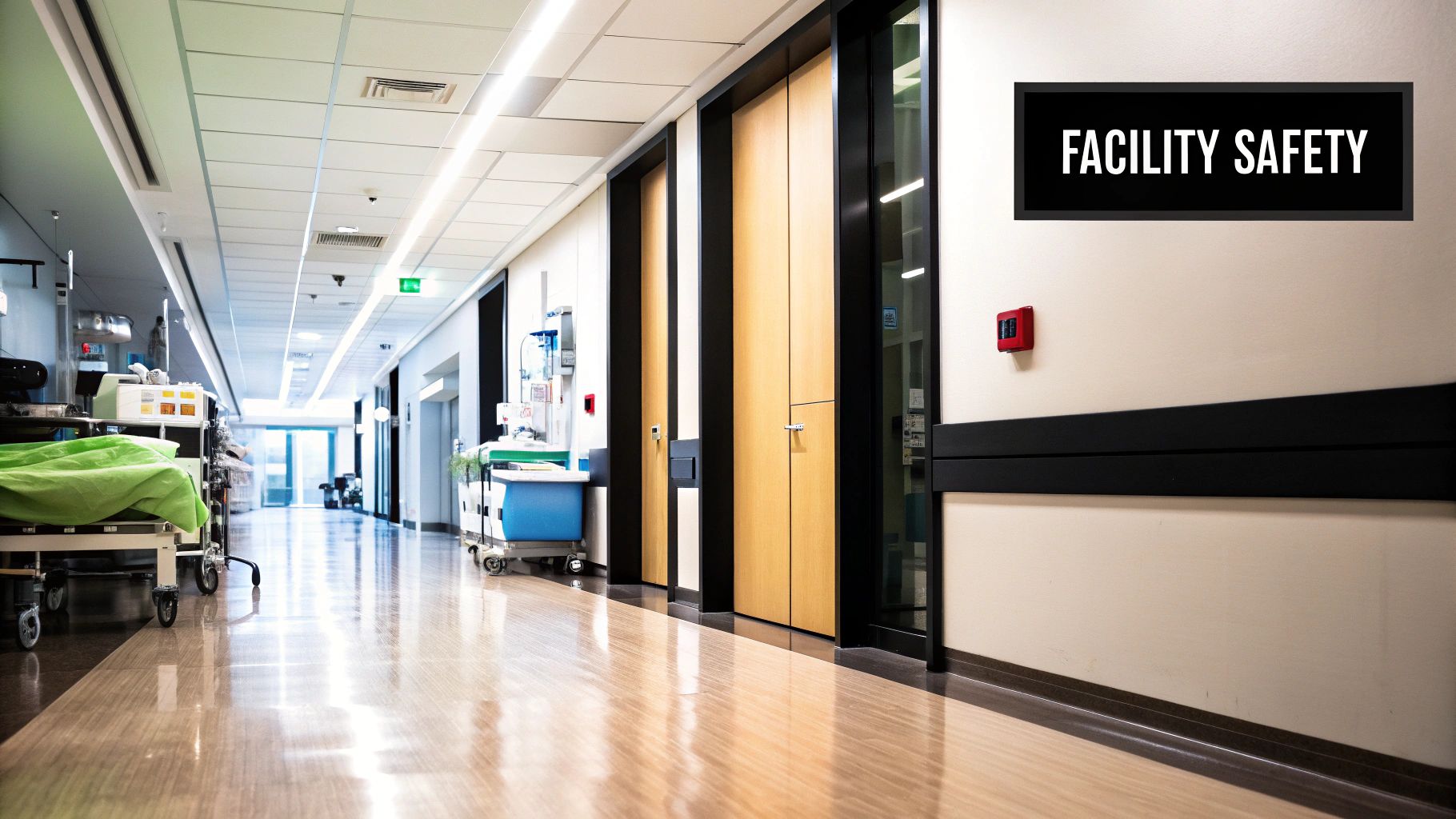
We've talked a lot about finding the right surgeon, but where they perform your procedure is just as crucial to your safety and final result. This is where we get into the nuts and bolts: understanding the real costs involved and making sure the operating facility is up to snuff.
These two things—cost and safety—are more connected than you might think. If you see a price that seems shockingly low, it’s often a sign that corners are being cut somewhere, whether it's in the facility's standards, the quality of anesthesia care, or the experience of the support staff. Making a smart decision means looking past the surgeon's fee to see the whole picture.
When you get a price quote, it should be an all-inclusive, transparent document. A classic pitfall is getting a quote that only covers the surgeon's fee, which leaves the door open for a flood of surprise bills down the road. An ethical practice will always give you a single, consolidated price.
Your quote needs to break down every single component. If it doesn't, that's a major red flag. A complete, honest quote should always include:
The cheapest option is almost never the best one in plastic surgery. A price that seems too good to be true is often a warning that they might be skimping on experienced anesthesia providers, facility safety protocols, or even the quality of the implants or materials used.
Cost and quality are huge factors when patients are figuring out how to choose a plastic surgeon. While the United States sees over 6 million cosmetic procedures annually, many people also explore options in countries like Mexico and Turkey, seeking a balance of affordability and quality. Regardless of where you go, a detailed cost-benefit analysis is essential, especially for popular procedures like breast augmentation, which is on track to make up 25% of all surgical cosmetic procedures in 2025 and requires surgeons with a proven track record. You can see more on these global plastic surgery trends for a broader perspective.
Never, ever assume that a beautiful office has a safe, certified operating room tucked away in the back. The single most important thing to look for in a facility is accreditation from a nationally recognized, independent agency. This is completely non-negotiable.
Accreditation is your proof that the surgical facility has voluntarily opened its doors to a rigorous inspection. It shows they've met the highest standards for patient safety, sterilization, equipment, staff training, and emergency protocols. Think of it as an objective seal of approval that says the operating room is on par with a hospital.
When you're in a consultation, ask the surgeon point-blank: "Is your on-site surgical suite accredited?" If they say yes, ask by whom.
Here is a quick look at the top-tier organizations that certify outpatient surgical centers. Knowing their names helps you understand what you're looking for.
Choosing a surgeon who operates in an accredited facility ensures the environment is properly equipped, the staff is trained for emergencies, and strict safety rules are followed. To get a deeper understanding, you can read more about the role of on-site surgical suites in patient safety and why this is such a vital piece of the puzzle.
Ultimately, basing your final choice on both a transparent cost and an unwavering commitment to facility safety is what will give you true peace of mind.
You’ve done the hard part. You've checked the credentials, poured over before-and-after photos, and sat through several consultations. Now you're facing what can feel like the toughest step: picking just one surgeon from your shortlist of great options. This is where you bring everything together—the facts, the photos, and your gut feelings—to make a decision you can feel truly good about.
It's time to look beyond the résumés and listen to your intuition. This doesn't mean tossing out all your careful research. It's about weighing that research against the human element. You're not just hiring a technician; you're choosing a partner for a very personal experience, and that connection is crucial.
By this point, every surgeon you're considering is likely more than qualified on paper. The difference-maker often boils down to something much less tangible: how you feel. When you walk out of a consultation, you should feel reassured and understood, not more anxious or pressured than when you went in.
Think back to each meeting. Did you click with one surgeon’s communication style more than the others? Did their staff make you feel like a person, not just another appointment on the schedule? These details aren't trivial. They're a sneak peek into the kind of support and care you can expect when you’re recovering and most vulnerable.
When all the credentials line up, your comfort and trust become the deciding factors. A surgeon might have the most impressive skills in the world, but if you don't feel a genuine connection, they aren't the right surgeon for you.
Pay attention to any nagging doubts. If something felt "off"—maybe the surgeon brushed off your questions, or the office seemed chaotic—that's a perfectly valid red flag. Your intuition is a powerful filter. Trust it, even if you can't logically explain why you feel uneasy.
Before you pick up the phone to book your surgery, do one last mental run-through. This simple check ensures you've considered every angle and can move forward without any second-guessing later on.
Deciding on how to choose a plastic surgeon is a huge milestone. By blending your methodical research with what your intuition is telling you, you can finalize your choice not just with hope, but with the quiet confidence of knowing you’ve found the right partner for your journey.
When you’re trying to figure out how to choose the right plastic surgeon, you're bound to have questions. It’s a big decision. Here are some straightforward answers to the things people ask us most often, aimed at giving you a little more clarity and confidence.
What's the real difference between a 'cosmetic surgeon' and a 'board-certified plastic surgeon'?
This is probably one of the most important things to understand. A board-certified plastic surgeon has gone through a minimum of six years of intensive, specialized surgical training and passed rigorous exams that are all about plastic and reconstructive surgery.
The title "cosmetic surgeon," on the other hand, isn't an official certification recognized by a major board. Legally, any licensed doctor can call themselves a cosmetic surgeon, even without specific surgical training. For your own safety and to ensure you’re getting a true expert, always confirm your surgeon is certified by the American Board of Plastic Surgery.
Why does it matter if my surgeon has hospital privileges?
Think of hospital privileges as an independent background check on your surgeon's skills. It means a committee of experts at an accredited hospital has already vetted their credentials, training, and track record.
When a hospital grants a surgeon privileges, it’s a stamp of approval. It shows they trust that surgeon to handle complex procedures in their operating rooms. If a surgeon only operates in their own private clinic and doesn't have these privileges, it could be a major red flag about their qualifications.
Is it a bad sign if a surgeon isn't all over social media?
Not in the slightest. While Instagram or TikTok can be a great place to see before-and-after photos, it's not a reliable measure of a surgeon's actual skill. Many of the most respected, highly experienced surgeons built their reputations the old-fashioned way: through word-of-mouth and consistently great results, long before social media was a thing.
A surgeon's credentials, hands-on experience, and the personal connection you feel during your consultation will always be more important than their follower count.
At Cape Cod Plastic Surgery, Dr. Fater’s three decades of board-certified experience and our on-site, AAAASF-accredited surgical suite provide the foundation of trust you deserve. You can schedule your personalized consultation with us today to learn more.

February 15, 2026
What is Sculptra treatment? Explore how this unique collagen stimulator works to gradually restore facial volume for natural, long-lasting rejuvenation.

February 14, 2026
Learn how to tighten facial skin naturally with proven skincare, exercises, and diet. Our guide offers actionable tips for achieving firmer, more youthful skin.
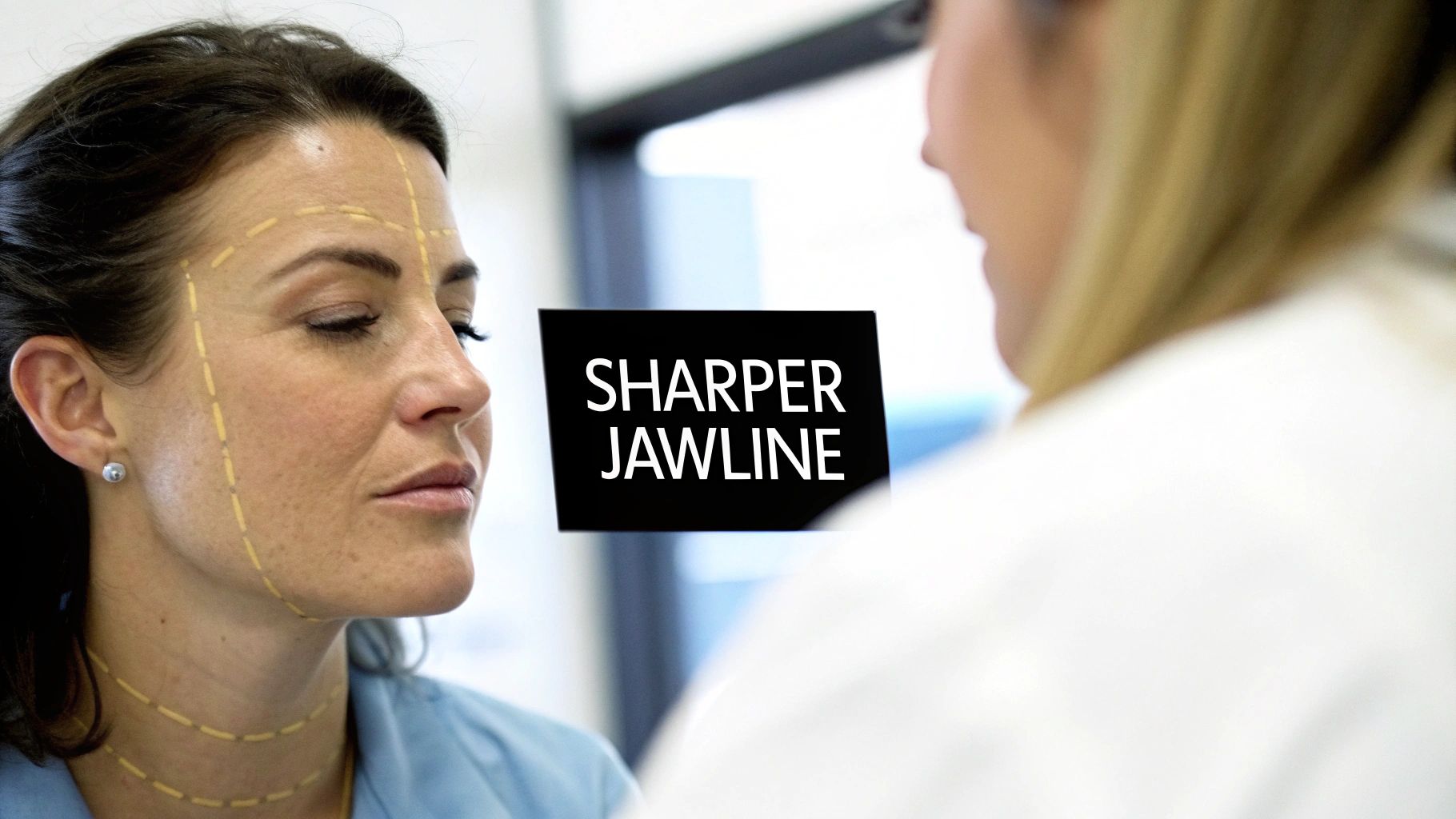
February 13, 2026
Considering Kybella for under chin fat? Learn how it works, what to expect, costs, and if you're a candidate in our complete guide to jawline contouring.